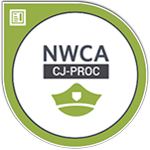PURPOSE
The Criminal Law & Procedure certification documents the essential competencies for professionals involved in the criminal and juvenile justice systems who must understand the laws and processes associated with criminal procedures including the constitutional basis for victim and offender rights, interrogations and interviews, formal proceedings, pretrial and trial activities, and the operations of the courts.
AUDIENCE
This credential is appropriate for professionals who work within or have interactions with the criminal justice system. These professionals include officers of the court, investigators, parole and probation officers, case managers, social workers, loss prevention specialists, correctional professionals, human service professionals, fire prevention professionals, and others.
JOB/CAREER REQUIREMENTS
Criminal Law & Procedure credentials demonstrate competencies related to the investigation, interrogation and interviewing, pretrial and trial activities, sentencing, and court-related activities of criminal offenders.
CRIMINAL PROCEDURE WORKPLACE TASKS:
- Law enforcement professionals must fully understand the procedures in investigation, the pre-trial and trial activities, and the court system in order to maintain the rights of offenders and victims.
- Social workers and various case managers counsel individuals, groups, families, and communities in areas related to statutory offenses, criminal offenses and victimization.
- School counselors are often involved in child welfare activities leading to and involved in criminal prosecution or defense of those accused of neglect or abuse.
- Various types of case managers may refer individuals and families to community resources related to criminal offenses or victimization.
- School personnel may assist with hearings and may provide testimony in cases related to criminal activities of children or abuse and neglect cases.
- Probation officers and correctional treatment specialists conduct meetings with offenders and their families and assist with the best course of action in their rehabilitation as well as write reports on progress.
- Parole officers assist those released from jail by providing them with resources and counseling designed to reduce the risk of committing additional crimes.
- Pretrial services officers investigate offenders’ backgrounds to determine the direction to take before the trial and make appropriate recommendations to the judge and court staff.
- Forensic scientists and technicians investigate crimes and must understand the laws related to criminal procedures.
- Fire inspectors and investigators investigate crimes related to arson and must understand the related laws and criminal procedures followed before and during a trial as well as the functioning of the court system.
- Paralegals and legal assistants investigate facts of a case, conduct legal research, organize and maintain documents, gather and arrange evidence and other legal documents for attorneys, write reports, and communicate with clients, witnesses, lawyers, etc. in preparation for pretrial and trial activities.
EXAM STRUCTURE OVERVIEW
Number of Questions in Exam: 135
Time Limit for Exam Parts:
- Criminal Procedures: 80 items
- Criminal Courts: 55 items
Total Time: 120 minutes
Overall Passing Score: 70%
(All sections require an individual passing score of 70%)

